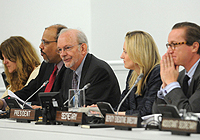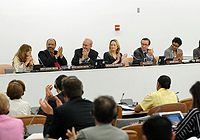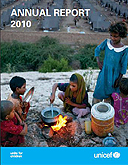UNICEF Executive Board
Executive Board looks to greater results for children despite challenges
2011 Annual Session begins
NEW YORK, USA, 20 June 2011 – The UNICEF Executive Board kicked off its 2011 Annual Session at UN headquarters in New York this morning with an eye towards achieving greater results for children despite the international economic downturn and other global challenges.
| VIDEO: 20 June 2011 – UNICEF’s Executive Board President, Her Excellency Sanja Štiglic, Permanent Representative of Slovenia to the United Nations, addresses the Executive Board’s 2011 Annual Session. Watch in RealPlayer |
“We owe it to children to live up to the promises we have made to them, most urgently those of the Millennium Declaration and Millennium Development Goals,” said UNICEF’s Executive Board President, Her Excellency Sanja Štiglic, Permanent Representative of Slovenia to the United Nations.
“In today’s increasingly insecure world,” she added, “we rely on UNICEF to continue to be the world’s greatest and most steadfast champion of children and their rights.”
Progress and achievements
This four-day session of UNICEF’s governing body began with a presentation and discussion of the Executive Director’s Annual Report. The report covers progress and achievements against the organization’s medium-term strategic plan for 2006 through 2013.
“It has been a good year, but a challenging one,” said Executive Director Anthony Lake. “Every part of UNICEF has been working on deepening our focus on reaching the most disadvantaged children.”
| VIDEO: 20 June 2011 – Executive Director Anthony Lake makes his opening statement at the 2011 Annual Session of the UNICEF Executive Board. Watch in RealPlayer |
In his remarks about the Annual Report – which preceded a more detailed presentation by Director of Policy and Practice Richard Morgan – Mr. Lake listed some of the tumultuous events that UNICEF and its partners have faced in the past year.
“Cascading catastrophes in Pakistan, Japan and elsewhere, the cholera challenge in Haiti, the continued rise in food prices, the increasing effects of climate change, and political strife in many countries have all taken their toll,” he said.
Decline in core resources
And the world financial crisis poses an ongoing threat to the world’s poorest and most marginalized children, Mr. Lake noted, “as many donor governments cut their aid budgets, and many partner governments cut social spending.”
 |
| © UNICEF/NYHQ2011-0841/Markisz |
| Executive Director Anthony Lake speaks from the dais at the 2011 Annual Session of the UNICEF Executive Board with (from left) Deputy Executive Director Hilde F. Johnson, Deputy Executive Director Martin Mogwanja, President of the 2011 Executive Board, Ambassador Sanja Štiglic, and Executive Board Secretary Nicolas Pron. |
At UNICEF, the downturn has been reflected in a decline in core resources for each of the past two years. To address that decline, budget reductions are being recommended for 2012 and 2013, primarily at the headquarters level. Mr. Lake emphasized that the cuts will not affect country-programme operations.
“Our budget must protect UNICEF’s capacity to act on behalf of children through our country programmes, including in emergencies and humanitarian crises,” he said. “This means no cuts in UNICEF country programmes, because everything we’re doing – and everything we aim to do – depends on the results we are able to achieve in the field.”
Goals for 2012-2013
The Executive Director’s report gave Executive Board members and delegates a wide-ranging overview of the results that UNICEF and its partners achieved in its main focus areas last year. It also outlined programmatic aims for the next two years.
For example, Mr. Lake pointed to the imperative “to eradicate polio once and for all,” and to greatly expand the use of new vaccines against the two biggest killers of children: pneumonia and diarrhoea.
On the issue of children and AIDS, he said, “we have the chance to be well on the road to achieving a generation free of HIV” through wider access to anti-retroviral treatment for pregnant women living with the virus – treatment that will eliminate new infections in infants and children.
 |
| © UNICEF/NYHQ2011-0842/Markisz |
| Participants in the 2011 Annual Session of the UNICEF Executive Board applaud Deputy Executive Director Hilde F. Johnson (left) for her efforts on behalf of the world’s children. |
Mr. Lake went on to detail additional goals involving the reduction of chronic under-nutrition, which can lead to stunting in young children; protection of children from violence, exploitation and abuse; and provision of access to a quality education for all children, with a particular focus on girls.
‘A better UNICEF’
One key to attaining these and other objectives is “building a better UNICEF,” asserted Mr. Lake. To that end, his report laid out a series of benchmarks for making the agency more effective, responsive, efficient, transparent and collaborative in the coming years.
“I cannot promise you that we will accomplish all we hope to by 2013, but I can promise that we will try,” Mr. Lake told the Executive Board. “I expect you to hold us accountable for that.”
Beyond the Annual Report, Mr. Lake announced two major changes in senior management at UNICEF. First, he said, Geeta Rao Gupta – most recently Senior Fellow at the Bill and Melinda Gates Foundation, has joined the organization as Deputy Executive Director. And second, Deputy Executive Director Hilde F. Johnson will be leaving UNICEF soon.


